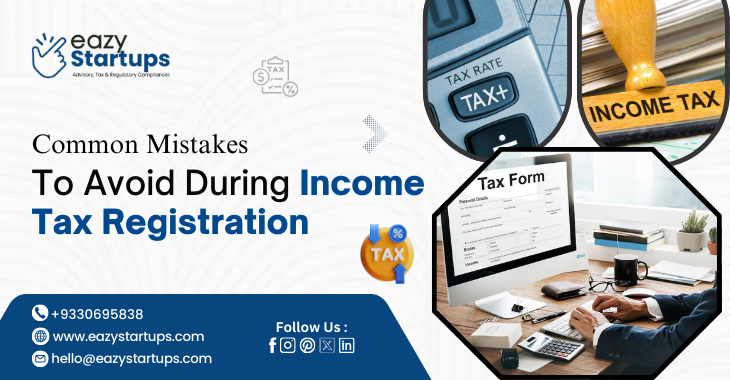Starting a business is exciting. But paperwork? Not so much Income tax registration is a crucial step for startups and businesses. Yet, many entrepreneurs make mistakes that lead to penalties, delays, or legal trouble. It’s like setting up a business and forgetting to unlock the front door—your business might be ready, but things won’t run smoothly without proper registration. Consult experts from Eazy Startups or any other reputed company for glitch-free Online Income Tax Registration.
Here are eight common mistakes to avoid:-
- Procrastinating the Registration Process
- Choosing the Wrong Business Structure
- Providing Incorrect Business Details
- Ignoring Mandatory Documents
- Not Linking PAN and Aadhaar
- Overlooking GST Registration
- Ignoring Post-Registration Compliance
Procrastinating the Registration Process:
Product development, along with marketing tasks and customer acquisition, dominate your attention. Tax registration? It can wait, right? Wrong.
Postponing tax registration will lead to difficulties in the future. The government imposes financial penalties when business registration occurs late, and unregistered entities encounter limitations on financial operations. A few entrepreneurs believe their business needs to register only after they achieve profit-making status. That’s a myth. Businesses must complete their early registration process even when they have not started making any revenue.
Choosing the Wrong Business Structure:
When establishing your business entity, you choose between sole proprietorship, partnership, LLP and private limited company without giving much thought to the decision. After selecting your business structure, you understand it does not align with your business model. Selecting the wrong business structure results in major consequences because it determines tax obligations, liability exposure and necessary compliance rules. The tax benefits of sole proprietorships remain straightforward, yet they do not protect from personal liabilities. Private limited companies deliver credibility yet require extensive paperwork requirements.
Providing Incorrect Business Details:
Small mistakes during your application process will trigger significant problems that you must handle. The process of obtaining approval for registration may extend because of mistakes in business address information or, PAN details or business activity codes. Starting a tech startup demands correct business classification, or your company registration will state that you operate a restaurant. Not good. Tax authorities verify details thoroughly. The process of correction and re-correction because of document mismatches causes valuable time to be lost.
Ignoring Mandatory Documents:
You complete your submission with pride before feeling sure about your accomplishment. Then comes the rejection. Why? You overlooked the necessary documents that needed to be included. The occurrence of this mistake proves to be more common than people realize.
Every registration process demands particular documents such as PAN card, identity proof, business address proof, incorporation certificate for companies and bank details. The absence of any required document leads to either rejection or unneeded time delays in the registration process.
Not Linking PAN and Aadhaar (For Individuals):
Sole proprietors and individual registrants need to link their PAN and UID numbers. Some entrepreneurs fail to link their PAN with Aadhaar and later struggle with return filing. Tax authorities have established this linking requirement as essential. The process of linking PAN and Aadhaar remains essential for your application to progress properly because failure to link could result in application delays and future tax filing restrictions.
Overlooking GST Registration (If Required):
Some organizations believe that obtaining income tax registration serves as their only requirement. Businesses must obtain GST registration in specific cases that depend on their turnover level and business category. Your business needs to register under GST if it provides services and reaches more than ₹20 lakh in revenue (₹40 lakh for businesses selling goods). Startups discover this fact too late after they receive penalty notices.
Ignoring Post-Registration Compliance:
The process of obtaining your income tax registration is complete. Done and dusted? Not really. Numerous businesses frequently overlook post-registration filings, tax returns, and compliance requirements.
Conclusion
A successful registration process and full compliance service can be achieved by avoiding these typical mistakes. Consulting with experts will help you make certain decisions. If you need help with Online Income Tax Registration, contact Eazy Startups.

